Copyright ©2008 PopEntertainment.com. All rights reserved.
Posted:
February 8, 2008.
After a few years of toiling on big-budget blockbusters that only
occasionally took flight – Oliver Stone’s Alexander and Michael
Mann’s Miami Vice come to mind – Colin Farrell has definitely downsized for his
latest two roles.
Ironically, in both Martin McDonagh’s In Bruges and Woody Allen’s
Cassandra’s Dream he plays first time hit-men who
have to deal with the fallout of their
actions. Farrell is particularly strong in Bruges, the first feature film
by maverick playwright McDonagh (The Pillowman, The Lieutenant of
Inishmore). Set
against the background of the beautiful-but-slightly-disquieting medieval
town of Bruges, Belgium, the
film is a clever and surreal tragicomedy.
Farrell works for the first time with fellow
Irish star Brendan Gleeson. They play Ray and Ken, two hit men who are sent
to cool their heels in the town by their bloodthirsty boss (Ralph
Fiennes in an extremely sinister extended cameo) after a hit goes horribly wrong. However,
despite the fact that Ray is distraught about the botched job, he can't help
but bitch about the town, antagonize locals and tourists, visit the pub
religiously and hit on any attractive woman who crosses his path.
Clémence Poésy is a French beauty who has become a star in her homeland with
films like Le Dernier Gang, Sans Moi and Le Grand Meaulness.
In recent years she has branched out to English language films, doing the TV
mini-series War and Peace and having a significant role in Harry
Potter and the Goblet of Fire. Poésy’s role in In Bruges is Chloë,
a mysterious woman who may work for a visiting film company, definitely
sells drugs, dabbles in crime and completely steals Ray’s heart.
We
met up at the Regency Hotel in New York with film stars Farrell and Poésy.
The actors were continuing a long day of promotion,
puffing on cigarettes and tapping ashes into water
cups. (At one point Farrell mistakenly tips it into
his own water and Poésy protectively moves the plastic cup away from him). However,
no matter how many questions they'd answered that day,
both actors smiled brightly and showed
an obvious friendship as they fielded queries about working In Bruges.
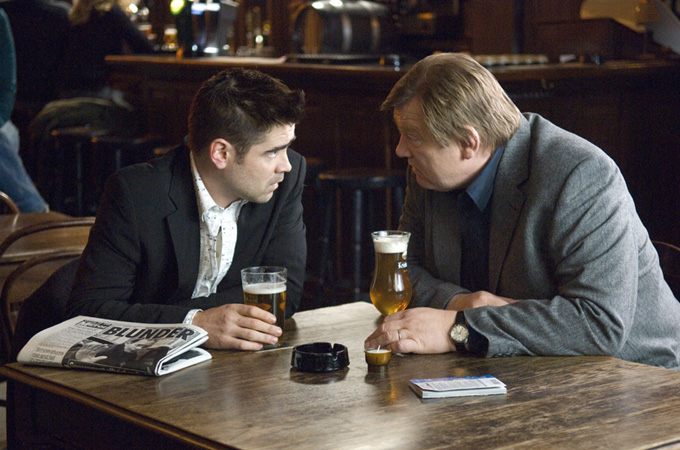 Colin, how
is it possible you have not worked with Brendan Gleeson before?
Colin, how
is it possible you have not worked with Brendan Gleeson before?
Colin Farrell:
Eh, I’ve just been avoiding him for years. No, I don’t know. I’m a huge fan
of his. And, you know, the Irish connection. I’m glad to get to work with
him this time. It really just seemed perfect. So perfect. So fortuitous that
it was on this piece. And to work so intimately with him. Such close
quarters.
Were you fans of Martin’s plays previously?
Clémence Poésy:
To be completely honest,
I didn’t know them. Believe it or not, he isn’t so big in France. I knew
about The Lieutenant of Inishmore.
Colin Farrell:
No, completely ignorant
to Martin’s plays. I’d been very aware of his success and that kind of a
theatrical movement that was very part of his work – all the accolades that
had come his way. But I wasn’t familiar with his work. I read The
Pillowman, which was genius, but I only read that after meeting. Then we
saw a version of (Clémence laughs)… The Lieutenant of Inishmore
came to Bruges in a hodge-podge of languages: French, Flemish and English.
Was it all used for the staging?
Colin Farrell:
Yeah, they performed it and they really – they took the script and they
translated it into this hybrid of languages. Strange, strange language. This
feral thing. I’d never seen it before and Martin was like,
“I can’t believe
the first fucking time you see my work…” But, it was wonderful. I think English was the most minimal of the languages. Very sparing.
A couple of words here and there, but I really gathered the idea of what was
going on. It was beautiful. His work is always so…
Did the blood translate?
Colin Farrell:
Well, it was on a shorter budget than here, so they really pulled out some
tricks to replace certain things that would be more expensive.
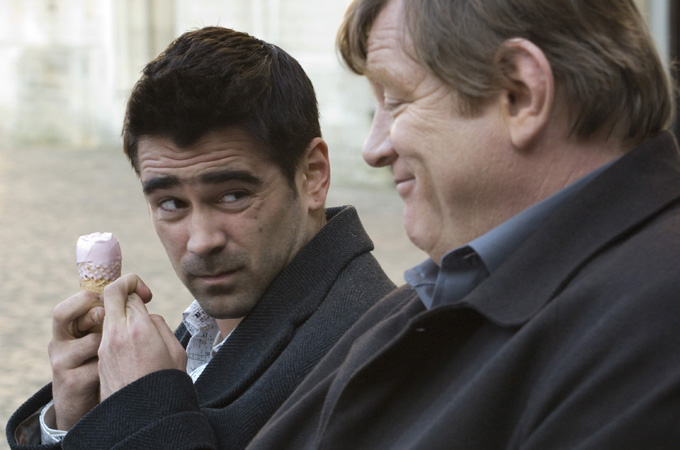 What’s the greatest challenge for you doing comedy, as opposed to playing
dramatic roles like
Alexander?
What’s the greatest challenge for you doing comedy, as opposed to playing
dramatic roles like
Alexander?
Colin Farrell:
I didn’t really see it as doing comedy. You know the script is hilarious…
You’re very funny.
Colin Farrell:
Thank you very much. The script was hilarious on reading it. In rehearsal
there was a lot of cracking up. Sometimes it was difficult to get through
scenes without completely corpsing into uproarious laughter. But, eventually
you had to get to the stage where you got inured to the comedy, so you could
actually say what was sincere and what was genuine and build subtext beyond
the surface with these characters. Because, they had no idea how endearing
they are being in their speech. Ray doesn’t even have an idea how combative
he’s being a lot of the time. He’s very childlike in that way, that he has
no censorship. It took a while to get to the stage where I didn’t find
it funny anymore, you know? At the end of the day, I’m playing a character
that is suicidal for three days and about as despondent as a man can be.
Was there one particular thing in the character that spoke to you and made
you say I have to do this role?
Colin Farrell:
Every page, genuinely. I mean, every page there was this incredible use of
language and situation. You know, Martin’s really something. He’s just
something incredible. Incredibly unique [with] the use of language. So it
was just every page. The thing as a whole, really.
Clémence Poésy:
It’s just you wish you could actually be able to come up with those lines in
real life. I’m never able to do that. So, it’s just great to have it written
for you to say. (laughs)
Colin Farrell:
Scary, though.
Ray kept saying that Bruges was a shithole. How did you find the city
to be?
Colin Farrell:
Yeah. He’s just projecting over shit,
isn't he really? You could have put him anywhere
and he would have said the same thing. He would have found something bad
about anywhere that he was. Plus, Bruges, I suppose, in essence is a very
real stark reminder of – well there is a reason why they are there, and the
reason is the reason, you know? So he’s constantly surrounded and immersed
in an environment that is just pointing the finger at him. Even though
nobody in the whole world has knowledge of why he’s there.
[Personally] I think it was
lovely. Bruges is a beautiful city. When we arrived, it was the middle of
winter and it was dark every day at four o’clock. There was an eeriness to
the place – cobblestone streets and all this old medieval architecture.
There was kind of a draconian feel to it in the middle of winter. No
tourists around. That suited me fine to go with that train of thought and
allow the environment to watch over me and use that. Whereas Brandon kind of
went the other way and said, “Hah! Lovely.” He was full of that, you know.
The two of us would kind of have arguments about the fact that it was a
shithole and it had nothing going for it once you see the tower. Once you’ve
done it, [you’ve done] the town. Which isn’t true.
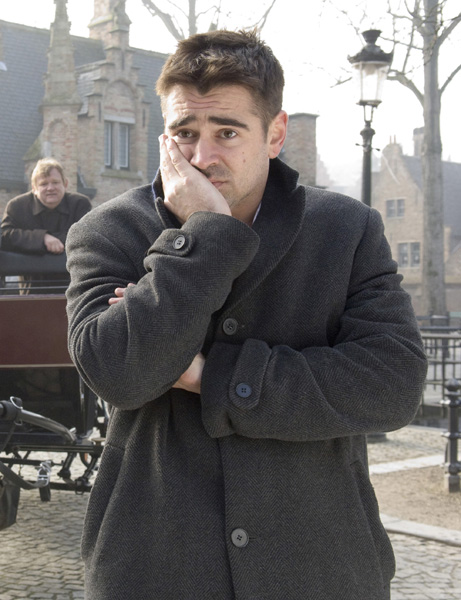 In eight years you’ve gone from
Tigerland and now you
are an A-list actor in Hollywood. I just wondered how your perception of
your career has changed.
In eight years you’ve gone from
Tigerland and now you
are an A-list actor in Hollywood. I just wondered how your perception of
your career has changed.
Colin Farrell:
I don’t know. I don’t know, man. I’ve been lucky enough to get incredible
opportunities over the years. I certainly didn’t carpenter the last three
films to be the size that they are... which is smaller. Certainly
budgetarily smaller than some of the things that I’ve done. But, I’m just so
fascinated with people and situations. Human beings are incredibly
interesting to me; beautiful and ridiculous, gentle and incredibly horrible
at times. So it’s nice to be involved with things that kind of ask questions
of why we are the way we are at times. Yeah, you know, jeez, I’m lucky to be
still working in that respect. (chuckles) It’s good. I enjoy what I
get from it.
Do you find you get more creative on lower budget films?
Colin Farrell:
Sure. There is an argument that characters can be a little more off what is
perceived to be the center in smaller films. There has to be a kind of
common denominator with the bigger pictures. There’s usually a protagonist
or two protagonists and the language is usually… I don’t want to say more
rudimentary, but possibly more rudimentary… which is not necessarily a bad
thing or ugly on the ears. But certainly with the themes that have been
explored are probably lower than this. The use of language; I felt I could
push the bottle a little bit more. Especially on In Bruges, it was
such an almost ridiculous world to inhabit and the characters had such an
extreme way of conversing that I could kind of understand reading it but
then at the same time it was scary. How the fuck do I
say these words? How aware is Ray of what he is saying? Or how completely
unaware is he of how offensive he may be being or how outlandish his
viewpoint is? That’s the beautiful thing about Ray. It goes back to your
question. He’s not really aware of how ridiculous he is at times.
You have two movies right now where you play a man who has his first hit and
has to deal with it – this and
Cassandra’s Dream. Was
that just a coincidence?
Colin Farrell:
Uh, yes, absolutely. Yeah, because I never murdered someone. (laughs)
It wasn’t something that I wanted to have a closer look at. Purge myself of
my sins through the creative aspect of being a part of a film. Yeah, it was
just a coincidence, you know? Woody [Allen] had this film. I got to meet him and
read the script. Then Martin came along with this. It was just coincidence,
but a fond coincidence.
What was Woody like to work with?
Colin Farrell:
He’s cool. He’s lovely. Really lovely, yeah. I mean I think I probably
talked more to Martin in the first day of rehearsal than I did to Woody in
the whole film. (laughs) Which is not to say I was ostracized or ever
felt like that, but [he’s] just a lovely, shy man. Incredibly smart and
lovely turn of phrase. I really liked working on the film.
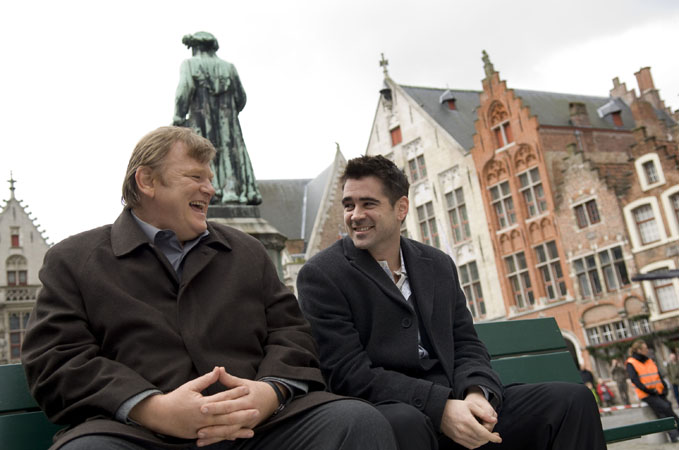 Could you talk about the collaboration with Brandon? Much of the dialogue
sounded very spontaneous.
Could you talk about the collaboration with Brandon? Much of the dialogue
sounded very spontaneous.
Colin Farrell:
Well, Martin only really wrote an outline. A lot of the dialogue was written
by ourselves. (laughs) To tell the truth, he just gave us plot
points, really and rolled the camera. You know, yeah, we had Lorne Michaels
over and we workshopped. (Turns serious) No… it was
rehearsal, really. Rehearsal. We already had great content and we’d just
rehearse and rehearse and rehearse – to the point where we were all really
familiar with the characters and the situations, but never to the point
where there was a stagnancy that appeared. Never once did it feel
repetitious. By the time we got to the set, we felt like we had a grasp of
who these people were and why they had done the things they had done. We
never felt like we were retreading the same ground. There was still a lot of
room for exploration. Those were the most surprising things. A testament to
how brilliant the script was… that after three weeks of talking about it and
looking at it, every time we asked a question that was important, [and] we
came to a decent conclusion, there would be five-ten other questions that
were on the table as result of asking that one. That really was kind of
regenerative.
Was it more rehearsal than you’ve done for other films?
Colin Farrell:
Yeah, barring Phone Booth. We did a good bit of rehearsal there.
Alexander, we did a good bit of rehearsal there in the desert of
Morocco, but Phone Booth, because it was a ten-day shoot we were
under the kibosh, so we had to make sure that we had an understanding of it.
Two weeks long table with all the cast, and then a week on the streets in
downtown LA.
How long was this shoot?
Colin Farrell:
Seven and a half or eight weeks.
Your character was always complaining that he was bored in Bruges. What do
you consider the ultimate cure for boredom?
Colin Farrell:
I don’t know. Anything. I’ve got such a general taste on most
things. Just music and films. I really do. Anything from Public Enemy
to…
What’s your favorite Public Enemy disk?
Colin Farrell:
(laughs) I wasn’t talking of the band. I was talking about the Jimmy
Cagney film. But, yeah, I used to listen to Chuck and Flavor do their thing
in the late 90s. A lot of good stuff back in the day. And Ice Cube. I used
to listen to all that. I have eclectic tastes as far as things go.
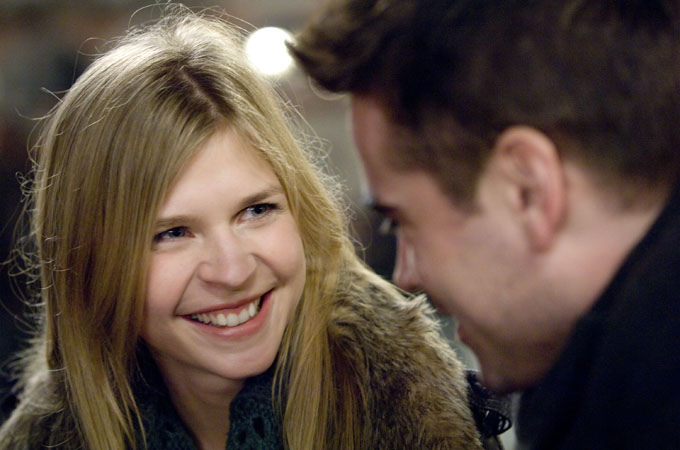 Your relationship
with
Clémence
in the film seems very tenuous. You’re not really sure who
the person is that you’re with. How much of that was in the script and how
much was you after you got the script?
Your relationship
with
Clémence
in the film seems very tenuous. You’re not really sure who
the person is that you’re with. How much of that was in the script and how
much was you after you got the script?
Colin Farrell:
Everything was fairly clear on the page.
Clémence Poésy:
Yeah, yeah. It was more
about the script. And then we had to forget everything that we learned when
we actually shot it. (laughs)
What was the most restrictive environment you’ve ever been in and how did
deal with it?
Colin Farrell:
Mine is pretty obvious. (long pause) To me. (laughs) Phone
Booth. It was pretty restrictive. The pants I’m wearing today are pretty
restrictive.
Clémence Poésy:
(laughs)
Set them free.
Let air come in…
Colin Farrell:
Very restrictive. But if I took them off they’d be free and I’d be free.
So where do you like to spend your time? Sorry, I didn’t mean to interrupt
you…
Colin Farrell:
Well, you did. I’m talking about my pants… (laughs)
Bruges is a
pretty beautiful place. Or Ireland… I’ve never been to Ireland. I just
wondered if you spent most of your time in Ireland or the United States?
Colin Farrell:
I spend most of my time in Los Angeles now. Still feel very much that
Ireland is home, but I’ve made a nice home as well in Los Angeles. My son is
there, so that’s why I’m there most of the time.
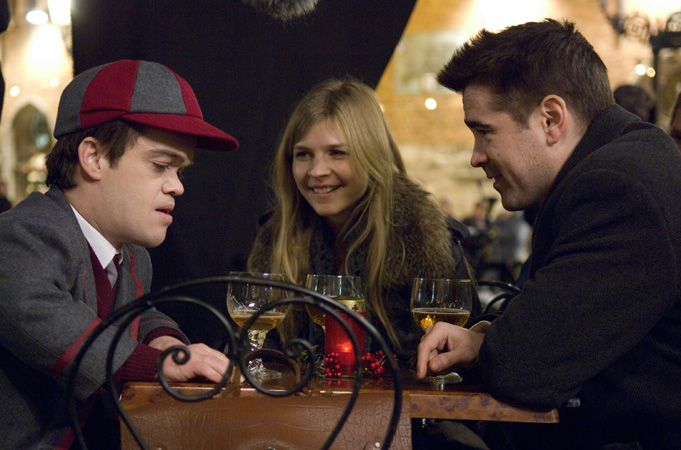 Clémence, I know this isn’t your first English film, but how is it different
acting when it is not in your native language?
Clémence, I know this isn’t your first English film, but how is it different
acting when it is not in your native language?
Clémence Poésy:
It’s – strangely –
easier. It’s a bit like playing with a mask on. You allow yourself to do
more than you do in your own language. You’re not listening to [the words]
as much, which is the worst thing you can do when you’re acting. You’re
closer to playing the emotions. Well, maybe that’s just me.
Colin, is it a relief to do a movie in your native accent?
Colin Farrell:
I’m the complete opposite. I’m like… when I have to do a dialogue, there is
a danger. It can be one of two things, just generally. It can be an avenue
into a character and a form of separating yourself from your own natural
patterns and sounds. There’s also a danger maybe it’s I haven’t
worked as hard as I should before. There’s been times where I’ve heard what I’m
saying and I’ve been aware of that and… It’s different, actually,
from what she’s saying, because you’re…
Clémence Poésy:
It’s not my language, yeah…
Colin Farrell:
You’re speaking English with a French accent and that’s fine. I’m talking
about a different accent and you can hear sounds pop in the middle of the
scene. As Clémence was saying, that’s the worse thing in the world to be
aware of. What you’re saying, being taken out of any given moment. So it was
incredibly liberating and fitting, again, to be able to use my own
vernacular.
The film jumps around from comedy to tragedy. Do you think that makes it
hard to watch?
Colin Farrell:
The fact that I’m in it makes it hard to watch, really. (laughs)
Makes it hard to watch for me. I imagine it could be jarring. Absolutely.
You know, we seem to be creatures that get very comfortable and very fast
with things being a certain way. With that in mind, yeah, it’s possibly
jarring. But I think that’s one of the great tricks that Martin is capable
of – to make the world and not just paint the film with one kind of
emotional or intellectual theme, but have an array of colors shooting
through it. I’ve talked to
people that come out and thought that it was a great comedy. Other people
come out and thought that it was incredibly tragic and heartbreaking. I
think Martin respects the audience enough to allow people to come away with
different opinions, instead of saying “This is what this film is. This is
what it’s going to engage with you. You’re going to feel this.” He just put
a whole hodge-podge of stuff out there and let it blow. They’ll experience
it however they experience it.
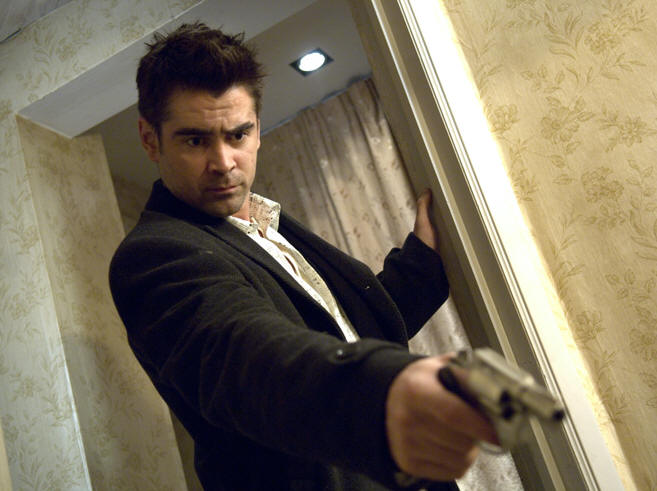 Is the way you look now [long hair, unshaven, beard] preparation for your
next role?
Is the way you look now [long hair, unshaven, beard] preparation for your
next role?
Colin Farrell:
Playing myself. No, it’s kind of laziness. No, not really.
Are there any projects you’re working on that are being affected by the
writer’s strike?
Colin Farrell:
No. I’ve been kind of gainfully unemployed for the last nine months or so,
since finishing Bruges. It’s been great. I’ve got to spend time with
people I like to spend time with. Hopefully, I’ll do something in April, but
nothing that I’ve been a part of has been affected by the writer’s strike.
Pride and Glory is all wrapped?
Colin Farrell:
Pride and Glory was wrapped before both of these pictures. Both
Cassandra’s Dream and In Bruges, yeah.
What was the attraction for that project?
Colin Farrell:
Great script. Wicked character. I’d seen Tumbleweeds and was a fan of
Gavin O’Connor. He wrote and directed this. I feel the need to speak up for
him more than my own interests in saying that the film hasn’t been pushed
back to 2009 because it’s a piece of shit. It’s actually a really strong
piece. Great performances from [Jon] Voight and [Edward] Norton and Jennifer
Ehle is amazing. Noah Emmerich. The cast is great. Gavin’s quite a
filmmaker. I just think it’s a case of New Line lost their bollocks on
The Golden Compass and they haven’t really got money to market it, so it
was pushed back. I hope – for Gavin more than anyone – that it’s resolved
and it gets an audience.
And that was shot here? [In New York]
Colin Farrell:
That was shot here. All in New York, yeah.
Did you have a New York accent in that one?
Colin Farrell:
That’s debatable, yeah. (laughs) Let’s just say he spent every
holiday in Boston, I think. Backstory. Cover myself.
Email
us Let us
know what you
think.
Features
Return to the features page.